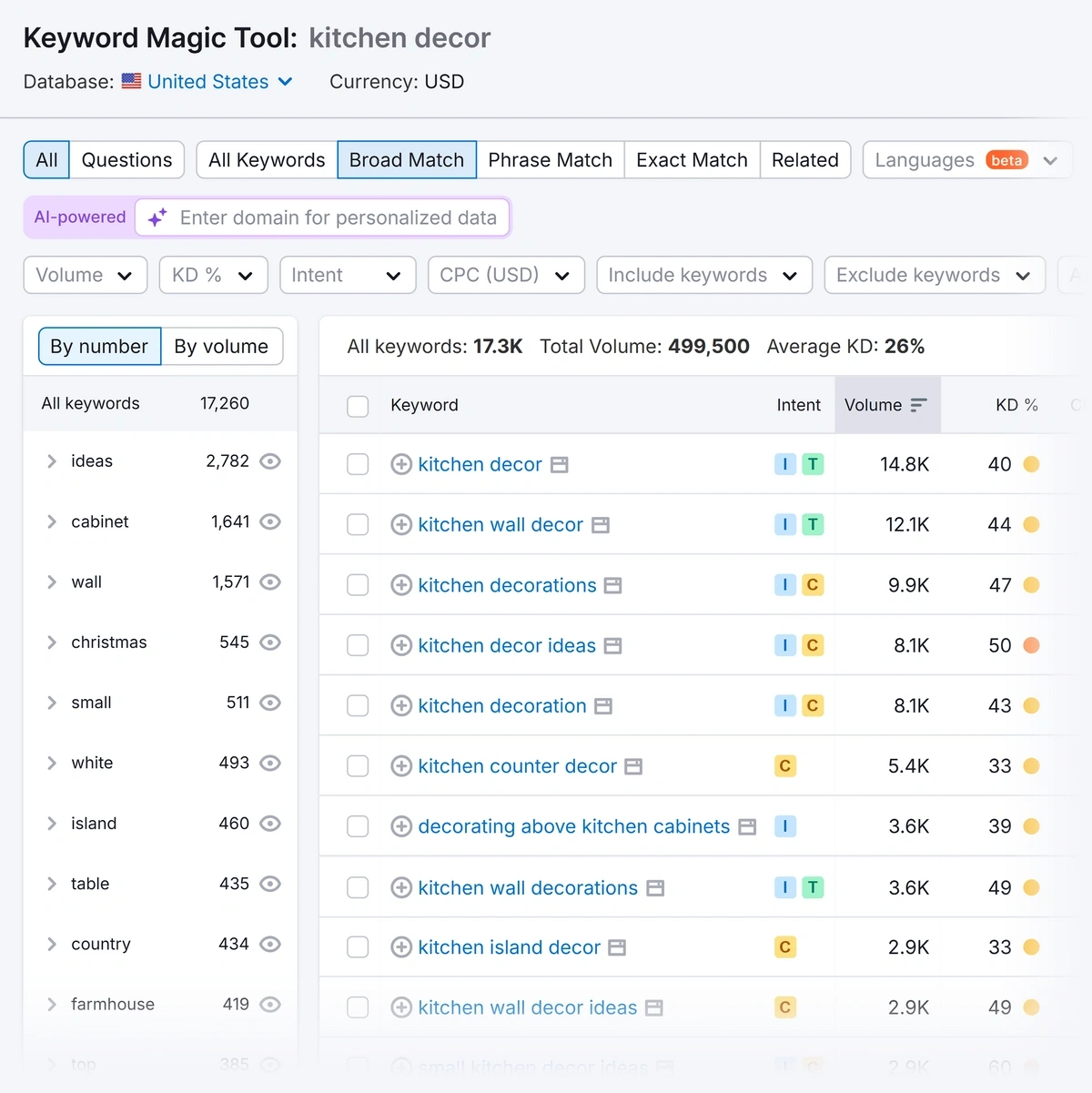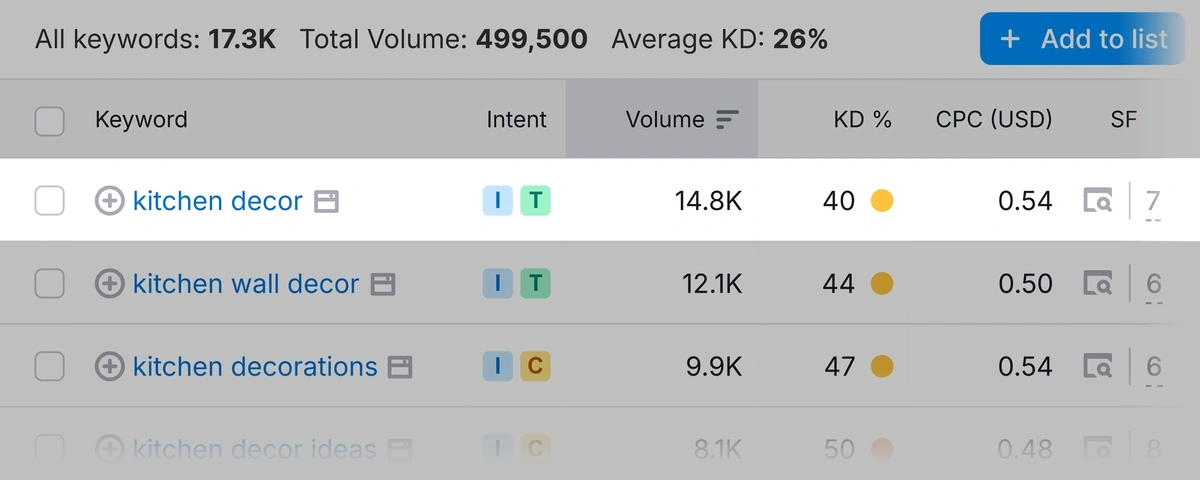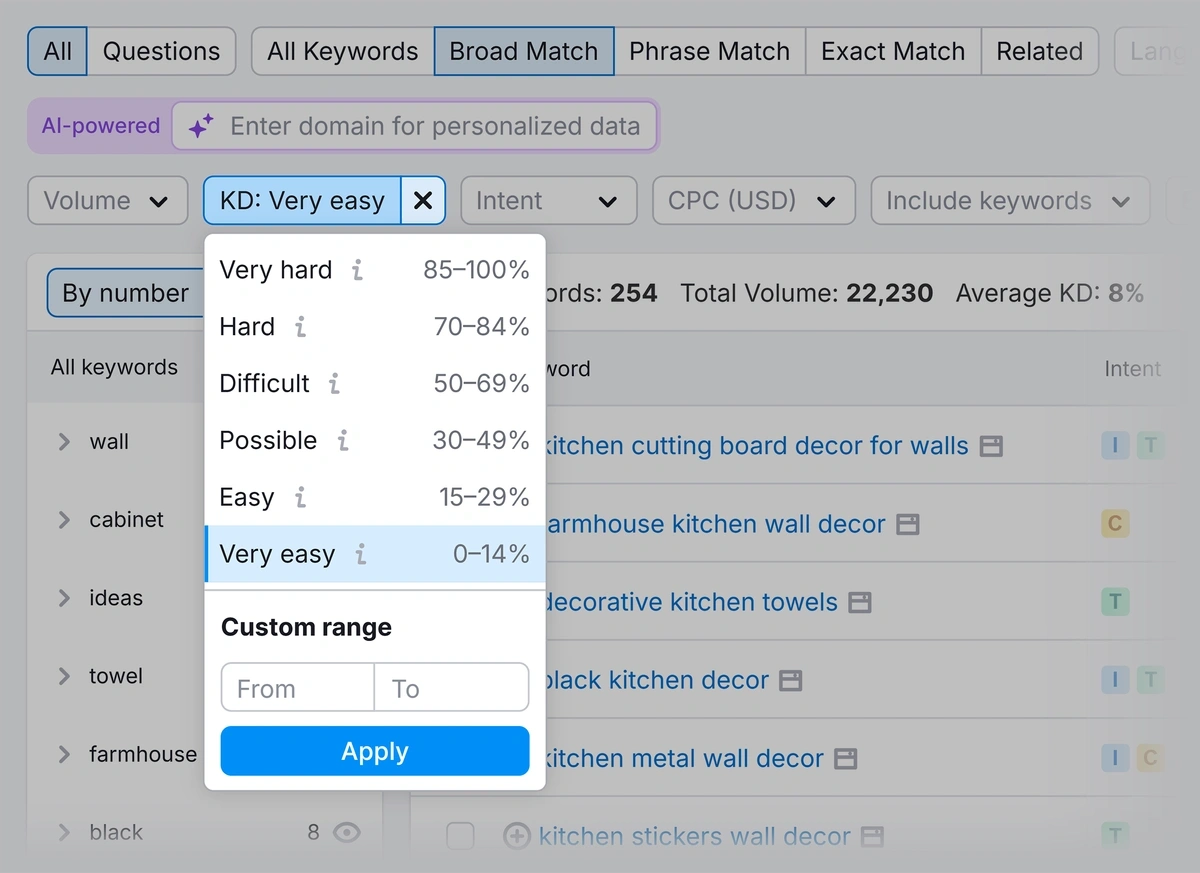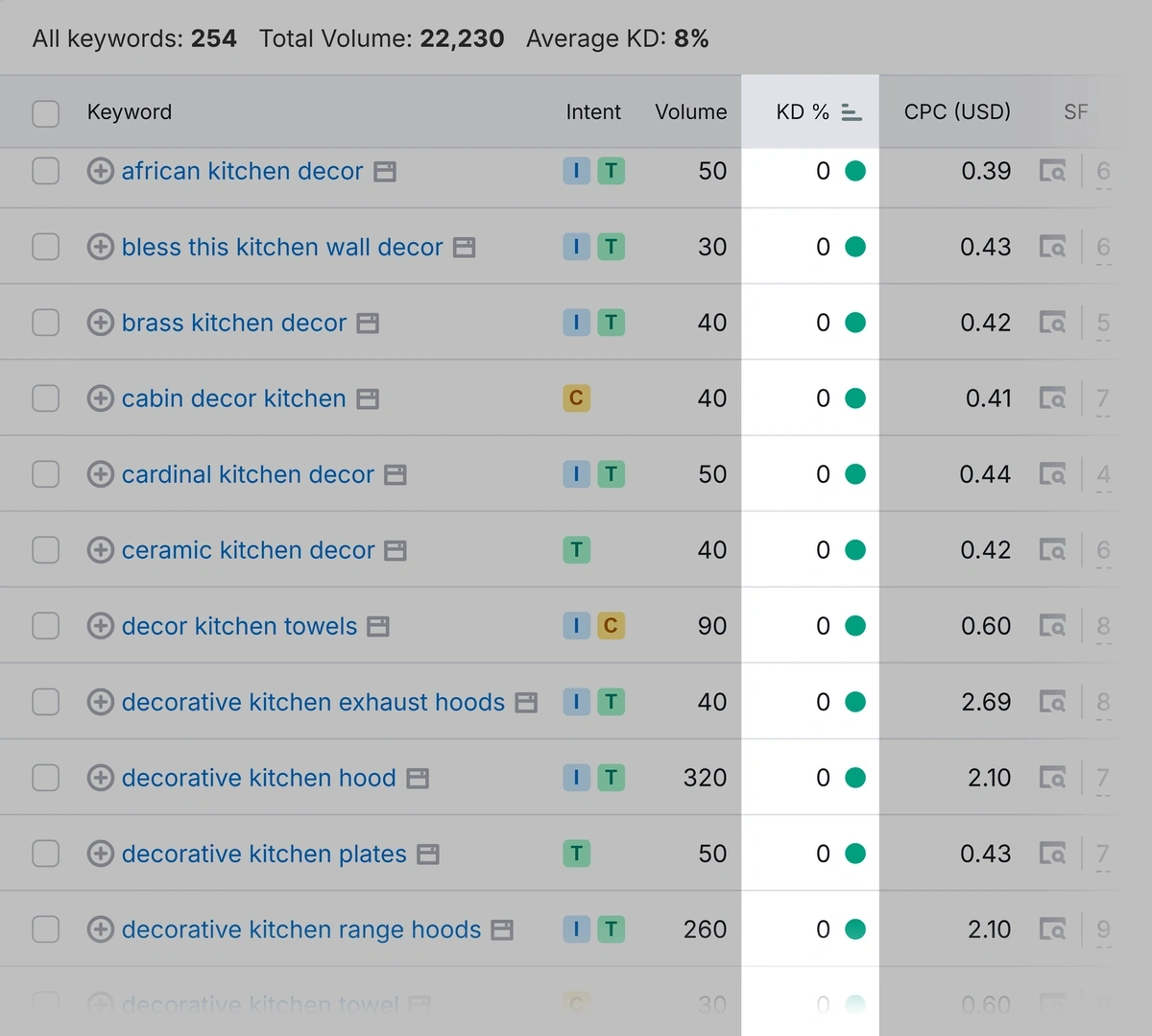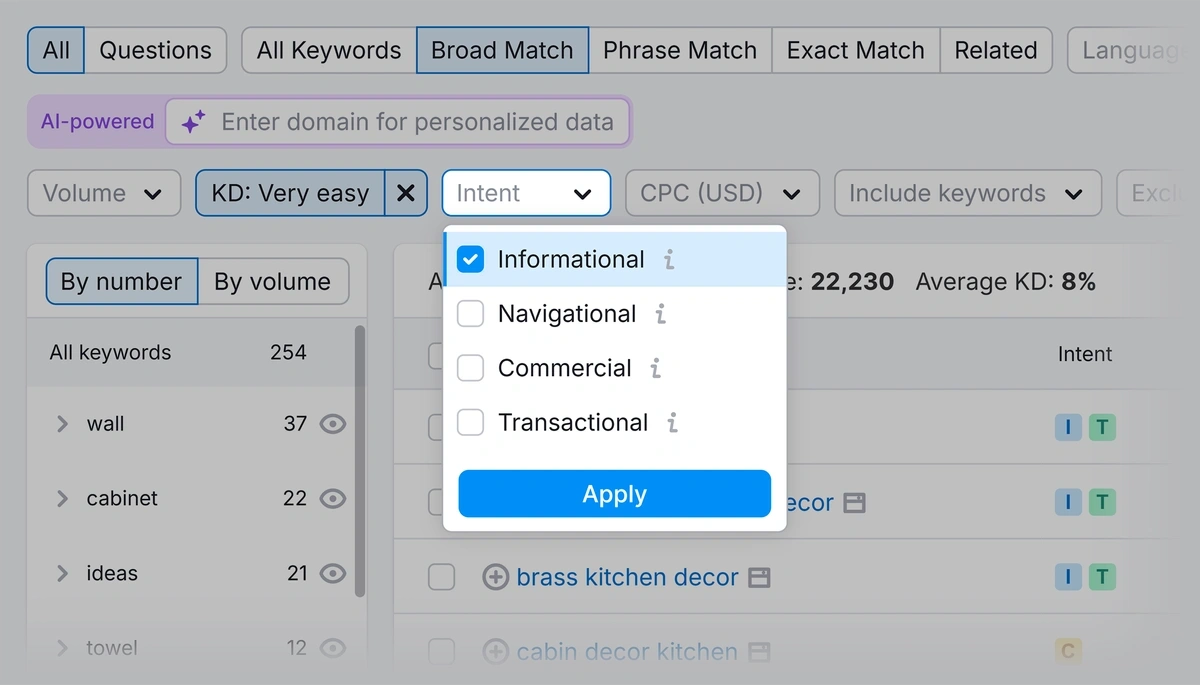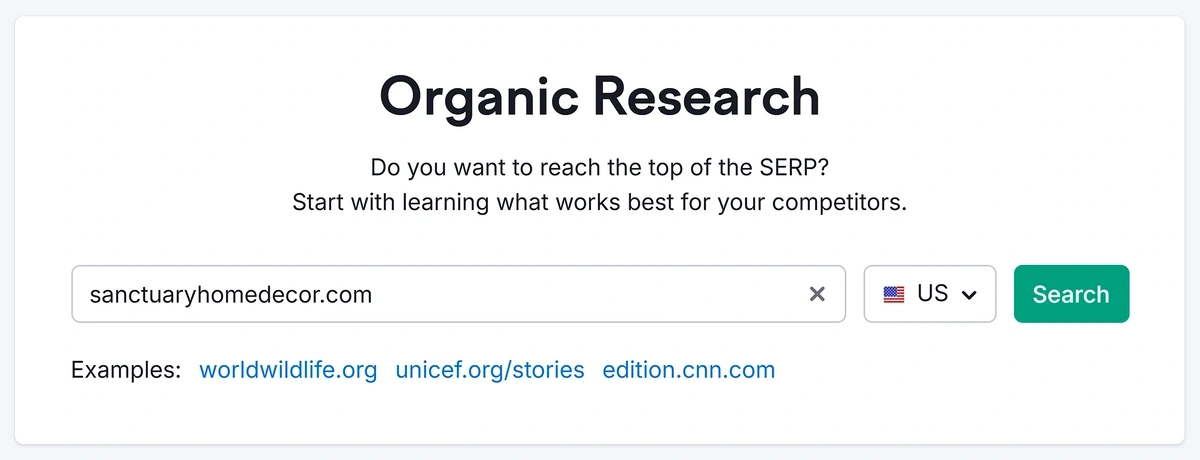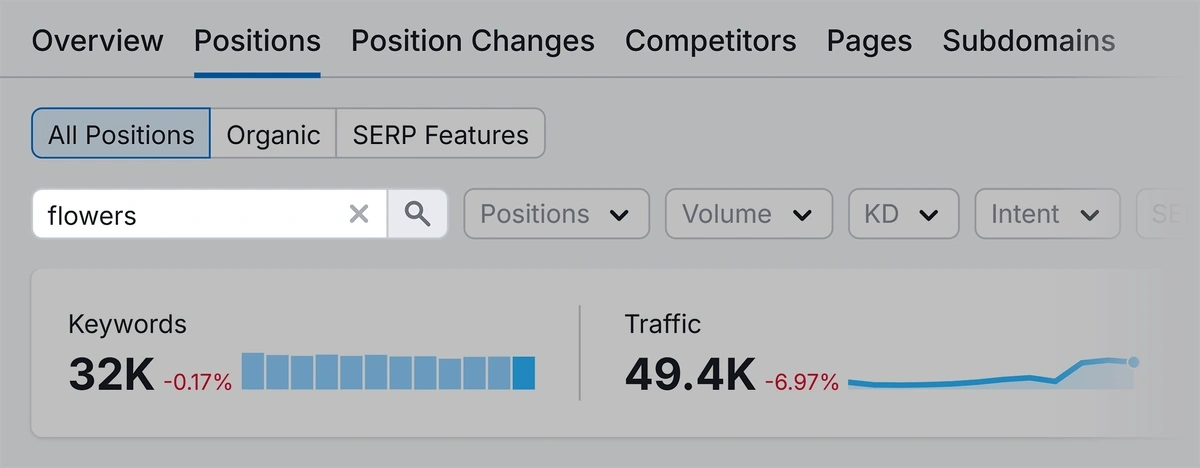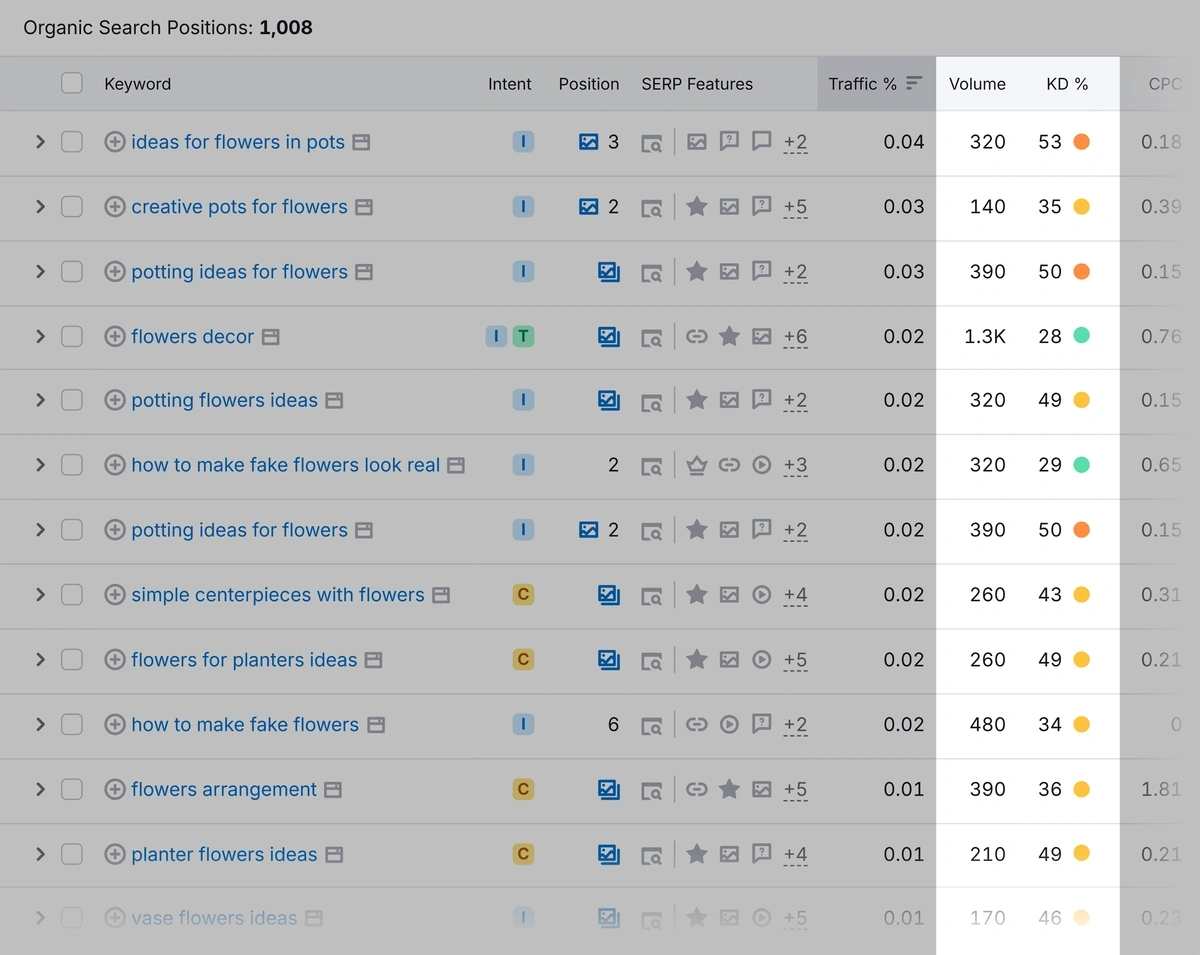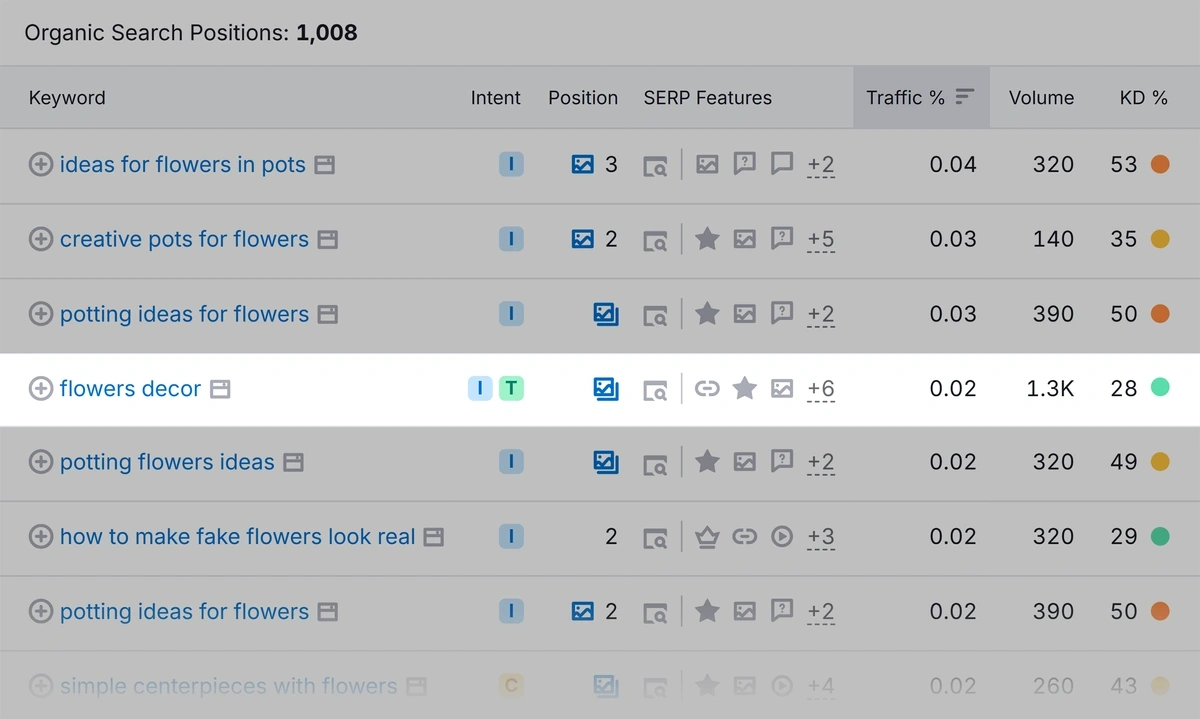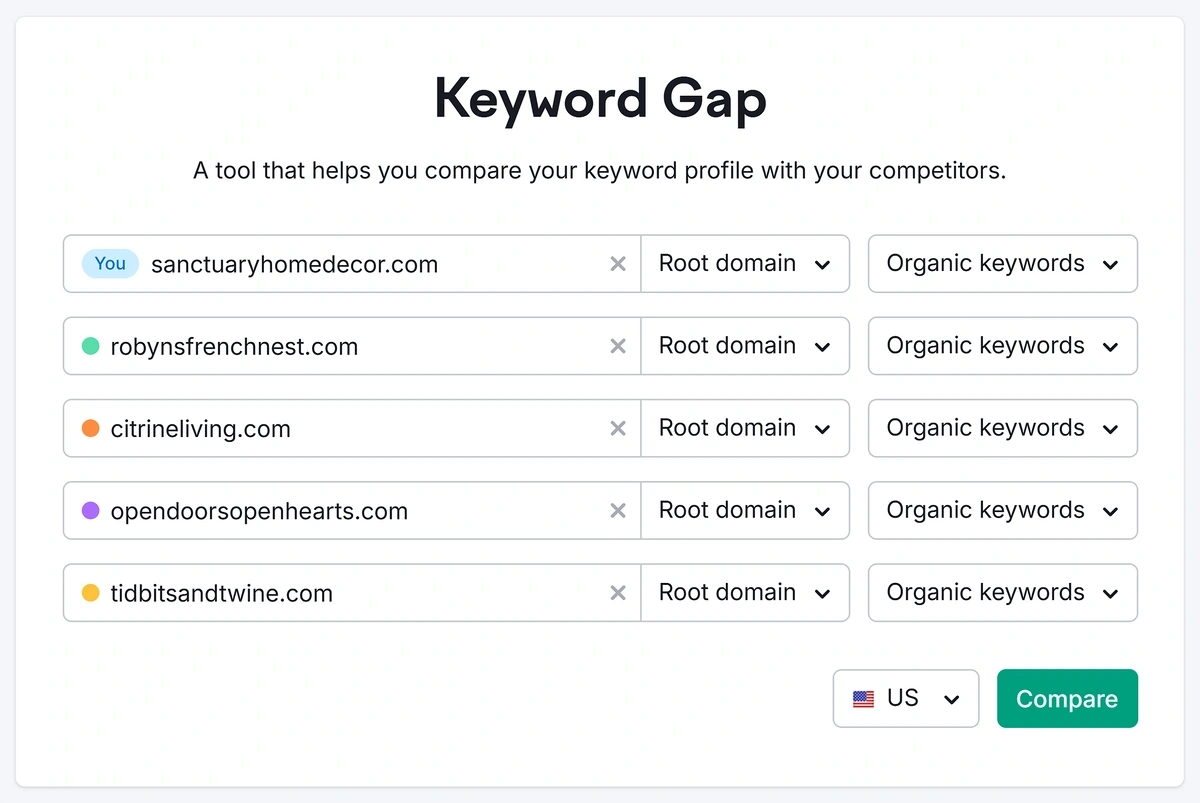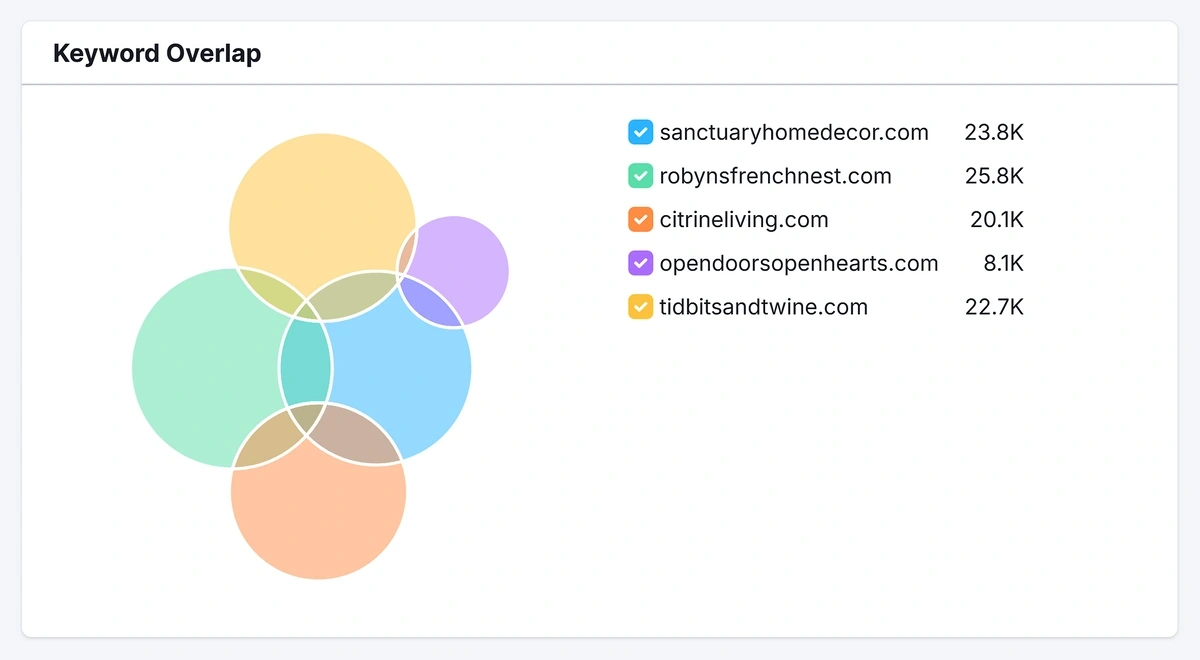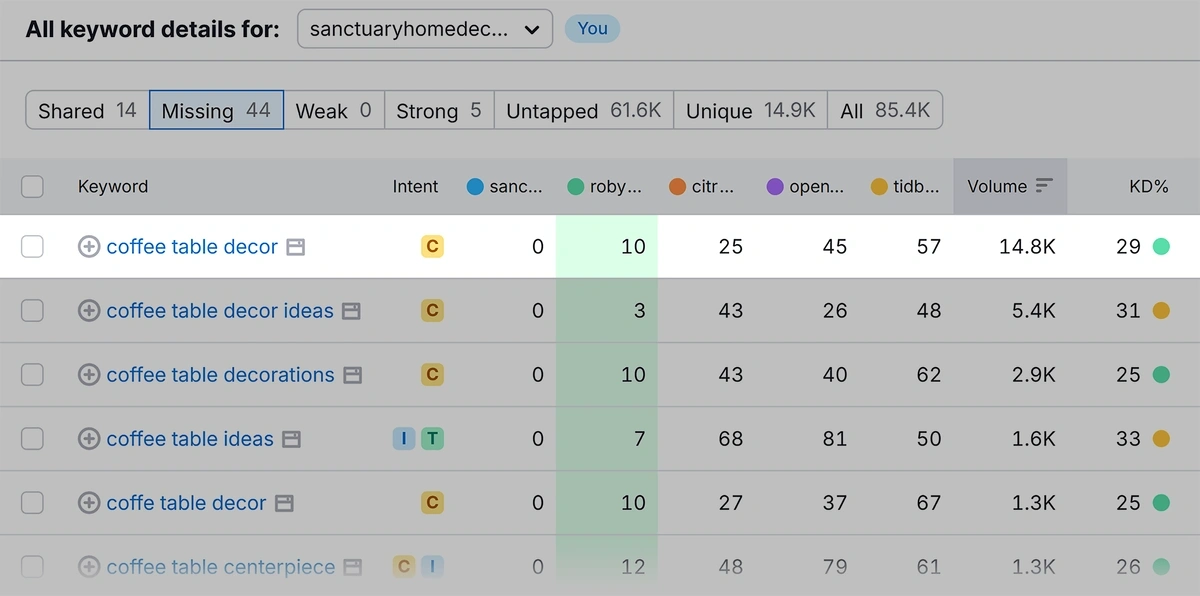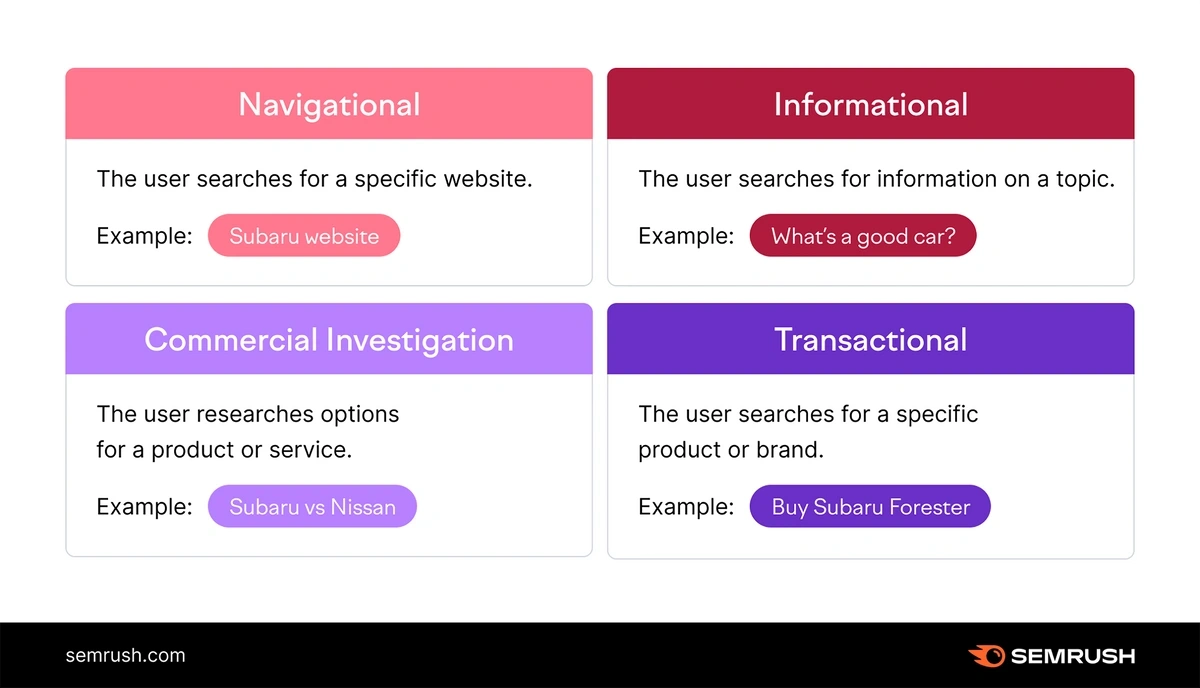Get Advanced Insights on Any Topic
Discover Trends 12+ Months Before Everyone Else
How We Find Trends Before They Take Off
Exploding Topics’ advanced algorithm monitors millions of unstructured data points to spot trends early on.

Keyword Research
Performance Tracking
Competitor Intelligence
Fix Your Site’s SEO Issues in 30 Seconds
Find technical issues blocking search visibility. Get prioritized, actionable fixes in seconds.
Powered by data from
A Beginner’s Guide to Low-Competition Keywords
Finding the right keywords is essential for improving your website’s visibility, but competing for popular search terms can be tough, especially for smaller businesses.
In this blog, we’ll explore how to identify low-competition keywords that can help you rank higher, attract the right audience, and grow your online presence.
What Is a Low-Competition Keyword?
A low-competition keyword is a search term (or phrase) that has fewer websites competing to rank for it in search engine results.
These keywords typically have lower search volumes but are much easier to rank for, making them ideal for smaller businesses or newer websites.
For example, a broad keyword like "coffee beans" is very competitive, because thousands of established businesses already target it.
More specific, longer keywords like "single origin coffee beans in [your city]" tend to have less competition, making them much easier to rank for.
While fewer people may search for that exact term, the ones who do are likely more interested in your specific offering. This gives you a better chance of attracting traffic that’s more likely to convert.
Most tools you can use to find keyword competition assign keywords a difficulty score. For example, Semrush gives keywords a keyword difficulty (KD %) rating out of 100.
The lower the score, the easier the keyword is likely to be to rank for.
Why Are Low-Competition Keywords Important?
Low-competition keywords are a game-changer, especially for small businesses or websites just starting out.
When you're new to the scene, it's hard to compete with established websites that dominate popular search terms.
That’s where low-competition keywords come in.
Think of low-competition keywords as the “low-hanging fruit” of SEO. They’re easy to “pick,” or rank for, because they have less content competing for them. Which makes it easier for your website to rank higher in search engine results.
This is crucial when you don’t have a huge budget or a team of SEO experts working for you. Or a lot of backlinks from high-authority websites.
For example, imagine you run a small bakery in a mid-sized town.
If you target broad keywords like "best bakery" or "buy cakes," you’d struggle to rank without a lot of quality backlinks. But a more specific keyword like "best gluten-free cupcakes in [your town]" is much easier.
Not only are there fewer websites trying to rank for this term, but the people searching for it are likely looking for exactly what you offer. This helps you connect with your ideal audience faster—and with fewer resources.
Low-competition keywords also help you build authority over time.
By focusing on niche, less competitive terms, you can steadily increase your website's visibility and credibility.
The more keywords you rank for, the more your domain’s topical authority grows, and the better positioned you’ll be to go after more competitive keywords.
Get More Search Traffic
Use trending keywords to create content your audience craves.
Examples of Low-Competition Keywords
There are several types of low-competition keywords that can help you attract the right audience while avoiding the overcrowded SEO battlefield.
Here are a few examples:
1. Long-Tail Keywords
Long-tail keywords are usually three or more words long and describe more specific search queries. While they have lower search volumes, they’re often easier to rank for and tend to bring in highly targeted traffic.
For example:
- Instead of "running shoes" (a very competitive keyword), try "best running shoes for beginners with flat feet."
- Instead of "SEO software," try "affordable SEO software for small businesses."
People searching for these terms usually know what they’re looking for, so long-tail keywords often lead to higher conversion rates.
2. Geo-Specific Keywords
Adding a location to your keywords makes them less competitive because you’re narrowing the audience down to a specific area. This is particularly helpful for local businesses.
For example:
- "best sushi restaurant" (high competition) vs. "best sushi restaurant in Austin, TX" (low competition, local focus).
- "yoga classes" (high competition) vs. "outdoor yoga classes in Central Park" (low competition, geo-targeted).
Geo-specific keywords are great for businesses that rely on local customers or serve a specific geographic area.
3. Niche-Specific Keywords
These are keywords that focus on very specific products, services, or customer needs within a broader market. If your business serves a particular niche, you can find low-competition keywords that speak directly to that audience.
For example:
- "organic skincare" (high competition) vs. "organic skincare for sensitive skin with rosacea" (low competition, niche-focused).
- "home gym equipment" (high competition) vs. "compact home gym equipment for small spaces" (low competition, niche-focused).
Focusing on niche-specific keywords allows you to target a smaller, more engaged audience, making it easier to rank and build authority in that space. Doing competitor keyword research can help to reveal what other players within a niche are (and aren't) covering.
4. Question-Based Keywords
These keywords are phrased as questions, often mimicking what people type into search engines when looking for answers. They can be great for blog posts or FAQ sections.
For example:
- "how to clean leather shoes" instead of just "leather shoe cleaner."
- "what’s the best way to improve Google rankings?" vs. "SEO tips."
Question-based keywords often appear in voice searches and can help you capture an audience looking for specific advice or information.
5. Product-Specific Keywords
These keywords focus on specific products, models, or services, especially if you offer something unique or less well-known.
For example:
- "best blender" (high competition) vs. "best portable blender for smoothies" (low competition, product-focused).
- "laptop" (high competition) vs. "lightweight laptop with long battery life for travel" (low competition, detailed product specification).
By targeting these types of low-competition keywords, you not only have a better chance of ranking in search results. But also attracting more qualified leads who are ready to take action, whether that’s making a purchase or booking a service.
Three Easy Ways to Find Low-Competition Keywords
Let’s look at three ways to find less competitive keywords worth targeting using Semrush, a powerful SEO platform.
Let’s get into it.
1. Find Keyword Suggestions
Use Semrush’s Keyword Magic Tool to get thousands of related keyword suggestions.
All you need is a starting keyword idea or “seed keyword.”
Once you’ve picked a seed keyword, pop that into the search bar, hit “Search,” and watch the tool work its magic.
For this example, we chose “kitchen decor.”
From this one keyword, the tool has generated 17,236 suggestions.
Notice that our starting keyword (“kitchen decor”) has a KD of 40%.
That’s not bad, but let’s see if we can do even better. We’ll do this using the filter function.
Click on the “KD %” dropdown above the keyword list to filter the results by keyword difficulty.
Select “Very easy” and hit “Apply.”
Now the list will show only low-competition keyword ideas with a KD of 14% or lower.
And if we look at the “Volume” column, we can see that these are all pretty solid keywords in terms of search demand.
You can also sort them in ascending order of difficulty by clicking the funnel icon to the right of “KD %” so it inverts. (By default, the keywords are sorted in descending order of search volume).
You can also filter by Intent to limit your suggestions to keywords that match the search intent you want to target.
Simply check the relevant intent(s) in the filter dropdown and click “Apply.”
Now you’ll only see low-competition keywords where “Informational” intent applies.
2. Explore Your Competitors’ Keywords
Using competitive analysis tools, you can analyze your competition’s website content for low-competition keyword opportunities.
To find out what keywords your competitors are targeting and ranking for, simply open Semrush’s Organic Research tool.
Enter a competitor’s domain (website URL) in the search bar and hit “Search.”
The tool will return a report on all the organic keywords your competitor’s site currently ranks for in Google’s top 100 results.
For example, imagine you own an interior design business, and the competitor you searched for is “sanctuaryhomedecor.com.”
To dig into your competitor’s ranking content and get a glimpse of their strategy, open the “Positions” tab of the report.
Use the search field to filter the list by keyword to explore all the keywords your competitor ranks for related to a specific topic.
For example, let’s filter using the keyword “flowers.”
If you scroll down, you’ll see all the related keywords the site ranks for.
Look at the “KD %” column to identify the lowest competition keywords, and cross-reference the keyword’s difficulty score with its search volume (in the “Volume” column).
In the “Traffic” column, you can also see how much traffic each keyword has driven to the site in the specified period (in this case, one month).
This can help you quickly spot which low-competition keywords have the most strategic value in terms of attracting organic traffic.
If a keyword drives a lot of traffic and has a low difficulty score and has a high search volume, you’ve hit the keyword research jackpot.
You can also apply various filters to narrow down your results, but we’ll discuss filtering in more detail in a moment.
3. Find Gaps in Your Content
Another way you can use your competitors to get low-competition keyword ideas is by running a keyword gap analysis.
To do this, open Semrush’s Keyword Gap tool and enter your own domain plus up to four competitors’ domains. Then hit “Compare.”
You’ll see a visual representation of your keyword overlap with the competitors you entered.
If you scroll down, you’ll find a list of all the keywords you and your competitors collectively rank for.
Toggle between the different tabs to identify keyword opportunities.
The “Shared” tab shows keywords you have in common with one or more competitor. The highest-ranking page for each shared keyword is shown in green.
The “Weak” tab shows shared keywords your competitors rank higher for, while “Strong” shows shared keywords where you rank the highest.
The “Missing” tab shows keywords your competitors rank for but you don’t.
Missing keywords with high search volume and low competition (KD %) are excellent opportunities. For example, in the screenshot below, “coffee table decor” has a volume of 14.8 thousand monthly searches, but its KD % is only 29.
Additionally, your top competitor ranks only ninth, which makes it even more likely you’ll be able to outrank them if you produce high-value content targeting this low-competition keyword.
The “Untapped” tab shows keywords you don’t rank for that at least one of your competitors does.
Now you know how to find high search volume, low-competition keywords.
But what now? Let’s find out.
How to Leverage Low-Competition Keywords
To use low-competition keywords effectively, you need to be a bit more strategic than just picking a few easy terms.
For real results, you need a strategy that helps you build authority in your niche and connect related keywords in a meaningful way.
Here are three tips to help you make the most of your low-competition keywords:
Factor in Search Intent
When choosing low-competition keywords, it's important to consider search intent, because not all searches are the same. Some search engine users want information, others are ready to buy, and some might just be comparing options.
Search intent is the reason behind a person’s search. It’s what they’re hoping to find when they type something into Google or another search engine.
For example, if someone searches for "how to bake chocolate chip cookies," they’re likely looking for a recipe, not to buy cookies.
We usually distinguish between four types of search intent:
- Navigational intent: Users want to find a specific page (e.g., “reddit login”)
- Informational intent: Users want to learn more about something (e.g., “what is seo”)
- Commercial intent: Users want to do research before making a purchase decision (e.g., “best coffee maker”)
- Transactional intent: Users want to complete a specific action, usually a purchase (e.g., “buy subaru forester”)
Understanding search intent helps you match your content with what users actually want, which is key for driving the right kind of traffic to your site.
Build Topical Authority
Topical authority means establishing your website as a go-to resource on a specific subject. Search engines like Google favor sites that show depth and expertise in a particular area.
This is where low-competition keywords can really shine.
Let’s say you run an online store that sells eco-friendly cleaning products.
Instead of trying to rank for highly competitive terms like "eco-friendly products," start by focusing on low-competition, niche-specific keywords, such as "natural all-purpose cleaner for kitchens" or "non-toxic bathroom cleaners for families."
By consistently creating valuable content around these more specific topics, you show search engines that your site is an authority in eco-friendly cleaning. This is because semantically related keywords help search engine crawlers understand what your site is about as a whole.
Use Keyword Clusters and Internal Linking
A keyword cluster (or topic cluster) is a group of related keywords that all tie back to a central topic.
The idea is to create clusters of interlinked pages related to the same topic and use internal links to tie these pages together. This helps you target multiple keywords at once and signals to search engines that your content covers a subject comprehensively.
At the center of your topic cluster, you’ll have a “pillar” page targeting a strategically important, often more competitive keyword.
The rest of the pages in the cluster target less competitive keywords and contain links to the central page and the other pages in the cluster, forming a web of related content.
For example, if you’re that same eco-friendly cleaning store, you might create a cluster of content around the central topic "natural cleaning solutions."
Within this cluster, you could include pages that target different low-competition keywords like "safe natural cleaners for wood floors," "DIY natural disinfectants," and "best pet-friendly cleaning supplies."
Keyword clusters help search engines understand the overall relevance and depth of your website. This improves your chances of ranking for broader keywords related to your niche as your credibility grows over time.
And you can measure your success using a Google rank checker.
Should I Completely Avoid High-Competition Keywords?
Not at all! High-competition keywords still have their place in your SEO strategy, even if you're a small business or just starting out.
For instance, if you own a small yoga studio, targeting a keyword like "yoga classes" might seem like a no-brainer. But ranking for such a term can take a lot of time, effort, and resources. You’ll be competing against national gym chains, large fitness websites, and well-established blogs.
That doesn't mean you should avoid high-competition keywords entirely.
Rather, view them as long-term goals.
Over time, ranking for lower-competition keywords will help build your website’s authority, providing a better foundation to compete for broader terms with higher search demand.
One option is to work high-competition keywords into your content in strategic ways without making them your primary focus.
For example, your yoga studio might publish several blogs about topics related to yoga that naturally use the keyword "yoga classes."
You won’t rank for such a competitive term right away, but sprinkling it into your content can help build your site’s topical authority over time.
It’s all about balance.
Focus on low-competition keywords to drive short-term traffic gains and work high-competition keywords into your long-term SEO game plan.
And keep track of how you're doing using Exploding Topics' free Website Rank Tracker.
Looking for more keyword research tools? Check out our guide: Top 9 Long Tail Keyword Generator Tools In 2024.
Stop Guessing, Start Growing 🚀
Use real-time topic data to create content that resonates and brings results.
Exploding Topics is owned by Semrush. Our mission is to provide accurate data and expert insights on emerging trends. Unless otherwise noted, this page’s content was written by either an employee or a paid contractor of Semrush Inc.
Share
Newsletter Signup
By clicking “Subscribe” you agree to Semrush Privacy Policy and consent to Semrush using your contact data for newsletter purposes
Written By


Josh is the Co-Founder and CTO of Exploding Topics. Josh has led Exploding Topics product development from the first line of co... Read more





